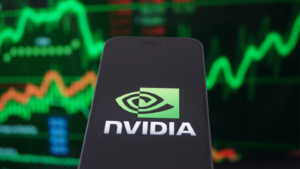
The world is a different, and better, place because of semiconductors. These little devices have become vital to everyday life in the 21st century. That’s why it’s a good idea to consider semiconductor stocks to buy in April.
Semiconductors are tiny but powerful. They play an important role in powering smartphones, laptop computers, vehicles, and medical equipment. Semiconductors are responsible for the sophisticated electronic equipment that we use every day.
Semiconductors are also becoming more powerful, allowing companies to develop applications that use artificial intelligence, machine learning, and the Internet of Things. Generative AI has become one of the biggest growth drivers for tech companies over the last year, making its advances possible by semiconductors.
We’re using the Portfolio Grader today to look for A-rated and B-rated semiconductor stocks that you can buy in April to capitalize on this trend. The names on this list stand out because of their growth, earnings performance and momentum.
They represent the best opportunities for anyone looking for semiconductor stocks to buy in April, and to capitalize on the backbone of the digital revolution.
Nvidia (NVDA)

Any examination of the best semiconductor stocks to buy in April has to start with Nvidia (NASDAQ:NVDA). The company’s stock rocketed 239% higher in 2023 and is well on its way to matching that gain in 2024.
Nvidia is dominating the market because of its enormous position in generative AI. It manufactures roughly 90% of the most powerful graphics processing units used in generative AI applications.
And now its rolling out its Blackwell GPUs, which will allow organizations to run real-time generative AI with trillion-parameter large language models at 25 times less cost and energy consumption.
Look for the biggest tech companies in the world to incorporate the Blackwell chip into their designs, and for profits to continue to flow for Nvidia. NVDA stock is up 73% so far in 2024 and gets an “A” rating in the Portfolio Grader.
Broadcom (AVGO)

Semiconductor manufacturer Broadcom (NASDAQ:AVGO) makes chips used in data centers, networking, software, storage, wireless and industrial applications.
Broadcom products power Ethernet switching and routing silicon products, controllers and transceivers.
Perhaps the most exciting thing for Broadcom, however, is its acquisition of VMware, which allows it to capitalize on VMware’s hybrid cloud platform. The platform provides large corporate customers with the power of a cloud network with on-premise data centers, and uses Nvidia GPUs to allow its customers to run AI models on-site.
While Broadcom has a heavy reliance on mobile chip customers, I like the moves it is making to expand into infrastructure software. Broadcom expects roughly half of its revenue to be from this category in 2024, and I wouldn’t be surprised if it’s the biggest growth opportunity for AVGO moving forward.
AVGO stock is up 18% in 2024 and gets a “B” rating in the Portfolio Grader.
Advanced Micro Devices (AMD)

Advanced Micro Devices (NASDAQ:AMD) has long been a top competitor to Nvidia, but it was left behind by Nvidia’s massive gains in 2023.
And AMD faced a fresh challenge in recent weeks when it was announced that China plans to phase out the use of AMD chips in its government PCs and servers. That helped push AMD stock from more than $200 per share just a month ago to around $165 today.
But I think there are brighter days ahead, and the bull thesis continues to hold for AMD. AMD’s Mi300 GPU accelerator is expected to generate $3.5 billion in revenue this year as an alternative to NVDA chips.
AMD also has a huge opportunity to provide AI-PC chips for AI-compatible central processing units for the personal computer market.
AMD reported fourth-quarter revenue of $6.1 billion, up 10% from a year ago. Earnings were $667 million and 41 cents per share, an improvement from $21 million and 1 cent per share in the same quarter of 2022.
AMD stock is attractive here on the dip. It gets a “B” rating in the Portfolio Grader.
Taiwan Semiconductor Manufacturing (TSM)

Whether you think it’s Nvidia, AMD or another company that will be the dominant force in providing Big Tech with the best semiconductors, it remains a smart bet to invest in Taiwan Semiconductor Manufacturing (NYSE:TSM).
The company, commonly known as TSMC, is the biggest chip manufacturer in the world, responsible for more than half of all contract chip manufacturing. And when it comes to making the most powerful chips on the planet, TSMC has roughly a 90% market share.
Nvidia, AMD and Broadcom all rely on TSMC to make their semiconductors. So, if you are betting on any or all of those companies, you’re also banking on TSMC to realize profits.
TSMC issued guidance for first-quarter revenue between $18 billion and $18.8 billion, with strong demand for high-performing chips. If it can top those numbers when it issues its report, you can expect TSM stock to jump.
TSM is up 34% so far in 2024 and gets a “B” rating in the Portfolio Grader.
Micron Technology (MU)

Micron Technology (NASDAQ:MU) is a semiconductor manufacturing company headquartered in Boise, Idaho. The company makes products for memory and storage technologies, including DRAM, NAND and NOR technology.
DRAM chips are used in every computing system, and AI systems require a lot of high-speed DRAM capacity. “We believe Micron is one of the biggest beneficiaries in the semiconductor industry of the multi-year opportunity enabled by AI,” CEO Sanjay Mehrotra said.
Micron posted its biggest sales gain in 12 years after posting guidance for the fiscal third quarter of $6.4 billion to $6.8 billion, far exceeding analysts’ consensus estimates for $5.99 billion. That comes on the heels of Micron reporting fiscal Q2 revenue of $5.82 billion, an increase from $3.69 billion just a year ago. Income of $476 million and 42 cents per share improved from a loss of $2.08 billion and $1.91 per share in fiscal Q2 2023.
MU stock is up 45% in 2024 and gets a “B” rating in the Portfolio Grader.
Photronics (PLAB)

Photronics (NASDAQ:PLAB) is another way to play the semiconductor space without investing in an actual semiconductor manufacturer. Instead, you can invest in a company that makes products that work with semiconductors.
That’s where we get with Photronics, a Connecticut company that makes semiconductor photomasks. These are opaque plates with transparent areas that allow light to shine through in specific patterns on semiconductors.
The market for semiconductor photomasks is estimated at $4 billion. Photronics earned $892.1 million in revenue for 2023 and $216.3 million for the first fiscal quarter of 2024, so there’s plenty of runway for this company.
PLAB stock is down 11% so far in 2024 but registered a 77% gain in the last 12 months. It gets a “B” rating in the Portfolio Grader.
QuickLogic (QUIK)
QuickLogic (NASDAQ:QUIK) makes low-power, multi-core semiconductor platforms and software. Its products are used in industrial, aerospace, defense, consumer, computing and AI applications.
QuickLogic also has an interesting subsidiary, SensiML, which makes AI and machine learning software. Its products are used in mobile devices used by medical professionals and industrial workers.
The company is growing fast. Fourth-quarter revenue was $7.47 million, up from $4.08 million in the same period last year. The company posted a profit of $2.04 million and 15 cents per share a year after losing $1.23 million and 9 cents per share.
QUIK stock is up 7% this year and 149% in the last 12 months. It gets an “A” rating in the Portfolio Grader.
On the date of publication, Louis Navellier and InvestorPlace Research Staff member primarily responsible for this article had long positions in NVDA. They did not have (either directly or indirectly) any other positions in the securities mentioned in this article.




